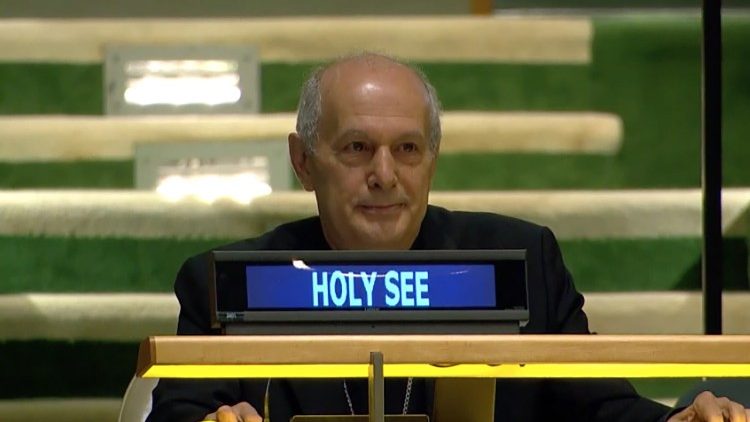Headline: <a href="https://www.world-today-news.com/holy-see-at-the-un-general-assembly-why-sell-weapons-to-those-who-harm-vatican-news/" title="Holy See at the UN General Assembly: Why sell weapons to those who harm? – Vatican news”>Archbishop Caccia Urges UN Unity for Peacekeeping Amid Crises
In a powerful address to the UN General Assembly, Archbishop Gabriele Caccia, the Holy See’s Permanent Observer at the United Nations, called upon member states to unite for peace in conflict-ridden areas. Highlighting escalating geopolitical tensions alongside growing environmental crises and human rights violations, Caccia emphasized the urgent need for consistent support for peacekeeping operations to protect vulnerable populations and establish secure societies.
Promoting Stability in Conflict Zones
On November 14, 2024, during the General Assembly’s 79th session, particularly in the Fourth Committee focused on Agenda Item 51—addressing the comprehensive review of peacekeeping operations—Archbishop Caccia delivered a poignant message. He outlined how peacekeeping missions are essential not only for rebuilding societies post-conflict but also for protecting civilians and fostering political processes that are conducive to lasting peace.
"Peacekeeping operations embody more than just a response to conflict—they are proactive measures that create the conditions for peace," Archbishop Caccia stated during his speech. He urged member states to reflect on the successes and challenges experienced in past peacekeeping efforts, advocating for a renewed commitment to peace.
Increasing Relevance Amid Global Tensions
With rising geopolitical tensions and an alarming surge in environmental crises, Archbishop Caccia pointed out that the stakes for peacekeeping operations are higher than ever. He expressed concern over the fragmented support these missions receive from member states, stating, “It is regrettable to note that these missions encounter difficulties in securing consistent and unified support from Member States.”
A Call for Collective Responsibility
The need for collective commitment was a significant theme in the Archbishop’s address. He strongly condemned the recent attacks on peacekeeping personnel, stating, “Member States must reaffirm their shared commitment to safeguarding the lives of peacekeeping personnel.” He urged nations to rally behind these crucial operations, stressing their indispensable role in global stability.
"Supporting peacekeepers is not just a diplomatic responsibility; it is a moral obligation that underlines our shared humanity," Caccia remarked, urging nations to prioritize the safety and efficacy of peacekeeping missions.
The Noble Pursuit of Peace
Archbishop Caccia concluded with a stirring affirmation: “Peace is a great and precious value, the object of our hope and the aspiration of the entire human family.” His heartfelt gratitude to peacekeepers resonated throughout the assembly, emphasizing their dedication to the common good and the vital role they play in conflict resolution and humanitarian efforts.
Contextual Background and Implications
The importance of the Archbishop’s message is underscored by the current global climate. Conflict-affected regions face not only military and political upheavals but also severe environmental challenges, which exacerbate human suffering. As the world grapples with these issues, the role of international bodies, particularly the UN, becomes ever more critical.
Peacekeeping missions have been historically pivotal in stabilizing regions post-conflict, facilitating humanitarian aid, and supporting local governance efforts. However, as geopolitical dynamics shift—often towards competition and confrontation—the need for cooperative peacekeeping strategies is paramount.
For further readings on peacekeeping strategies and their impact, refer to our articles on the role of international peacekeeping forces and the challenges in contemporary peacekeeping.
Future of Peacekeeping Initiatives
The collective actions taken today by UN member states will not only determine the success of current peacekeeping missions but also lay the groundwork for future interventions. The commitment to unify efforts across borders will prove crucial in establishing a sustainable framework for global peace and security.
As stakeholders in the realm of global peace, the time for action is now. By fostering dialogue, reinforcing commitments, and prioritizing the safety and effectiveness of peacekeeping personnel, nations can work together to create a more peaceful world.
What are your thoughts on the current state of peacekeeping operations? How can global unity effectively address the crises outlined by Archbishop Caccia? We welcome your comments and insights.
For additional information and updates regarding peacekeeping developments, visit Vatican News and explore our resources for a deeper understanding of these critical issues.
Related Articles
- The Evolution of Peacekeeping Missions: A Historical Overview
- Assessing the Success of Peacekeeping Operations: Achievements and Failures
By following these guidelines, readers are encouraged to engage more deeply in the conversation about the urgent need for globally unified actions towards fostering peace in our communities.

